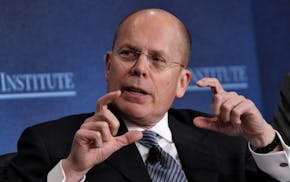Internet comments heaped scorn Thursday on UnitedHealthcare as the Minnetonka-based health insurer mourned the killing of its chief executive, Brian Thompson, who was shot just before an investor conference where the company was to reveal plans for greater profits next year.
Police have not publicly speculated on the motives of the person who shot at Thompson at least three times at close range Wednesday on a Manhattan sidewalk. But the sense that the shooting could be related to Thompson's job and UnitedHealthcare's reputation for denying care grew when it was revealed that one bullet casing found at the scene reportedly had the word "deny" written on it.
UnitedHealthcare is a for-profit company, but it's not proven whether it's really more aggressive than other insurers at denying care or simply that it draws more attention as the nation's largest health insurer. Public data sets on denial rates by insurance companies are limited. But the shocking shooting has put new focus on the firm, its reputation and history.
While the insurer grew into one of Minnesota's largest employers and economic engines, the state declined for decades to license it or any other for-profit company to sell HMO plans. That prohibition was lifted in 2017 when Republican lawmakers sought to expand insurance options for Minnesotans, but Democratic lawmakers in 2024 specifically prohibited for-profit HMOs such as UnitedHealth from selling plans in the state's growing Medical Assistance program.
"Let's face it: For-profit companies exist to legally maximize shareholder value," said Rep. Liz Reyer, DFL-Eagan, earlier this year when a court decision upheld Minnesota's for-profit prohibition. "That's their requirement."
The company has faced increasing public scrutiny and congressional inquiries over its denials of care, especially to elderly participants in Medicare Advantage plans. A report by a U.S. Senate subcommittee last October scolded UnitedHealthcare for denying prior authorization requests for expensive post-acute care at three times the rate that it denied other requests. UnitedHealthcare in response said it still approves the vast majority of requests for post-acute care for patients after hospitalizations, and that it is federally required to give these claims heightened scrutiny. The company also has been accused of relying on a claims process, supported by artificial intelligence, that had a 90% error rate in determining whether a requested treatment was medically necessary.
UnitedHealthcare announced as recently as March 2023 that it was dialing back some requirements for prior authorizations, but the publicly traded company is always going to face opposing pressures, said Wendell Potter, a former Cigna vice president who has since become a whistleblower on the industry's practices. An increase in spending on patients' care caused the stock of UnitedHealthcare's parent company to drop as much as 8% this fall, putting it under pressure from investors and analysts.
"It's a company that has been a Wall Street darling," Potter said, "and the way you become a Wall Street darling is you do a really good job of managing medical expense. It means you need to employ things like prior authorization and do it aggressively."
Thompson's widow, Paulette, told NBC News after Wednesday's shooting that her husband had received threats related to UnitedHealthcare's denial of medical coverage.
Some people on social media were brutally unsympathetic.
"When you shoot one man in the street it's murder," one person posted on the social media site X. "When you kill thousands of people in hospitals by taking away their ability to get treatment you're an entrepreneur."
Potter said the killing became an opportunity for some to publicly vent about UnitedHealthcare, because "nothing like this has ever happened before." The volume of criticism also relates to the insurer's size — it now covers roughly 47 million people through private plans it sells to employers or individuals, and public plans it offers through the government's Medicare program for the elderly and Medicaid program for low-income and disabled Americans.
Parent company UnitedHealth Group is in the top five of the Fortune 500 list, closely behind Apple. It has also become a major health care provider, employing or having affiliations with 10% of the nation's physicians through its Optum division.
A cyberattack against Optum's Change Healthcare division earlier this year affected 100 million patients, making it one of the largest data breaches in U.S. history. Some health care providers reported months-long delays in payments of claims in the aftermath of the cyberattack, and Andrew Witty, CEO of parent company UnitedHealth Group, was brought before Congress to testify about it.
"There's a lot of just pent-up outrage at this company and other companies that are middlemen that are standing between a patient and his or her doctor or hospital," Potter said.
Minnesota health care providers have reported excessively high rates of denials by UnitedHealthcare, but comparative data is limited and the company disputes some of those claims as attempts to gain leverage in contract negotiations.
The federal government compares individual plans under the Affordable Care Act by their claims and denial rates and showed in 2021 that UnitedHealth's qualified health plans in Arizona denied almost 39% of in-network claims. That was higher than the average denial rate of about 17% for comparable plans nationwide, but wasn't unique, according to a Kaiser Family Foundation analysis. Seventeen insurers posted denial rates above 30% that year.
Matthew Viergutz of Lutsen, Minn., filed a lawsuit against UnitedHealthcare last year because he had received prescriptions and insurance coverage since 2009 to receive two pills per day of a medication known as Vyvanse until UnitedHealth took over his employer health plan. The lawsuit says three psychiatrists in different states independently authorized two pills per day to help Viergutz manage his mental health condition, but the insurer would only pay for one. Viergutz spent thousands out of pocket to cover the difference over the past two years. His lawsuit claims that UnitedHealthcare made its decision without any investigation or familiarity with his medical condition or prescription history. UnitedHealthcare argued in response that its decision was legal and within coverage guidelines.
Stories of denials are common, said Unai Montes-Irueste, a media strategist for People's Action, an advocacy group that has conducted public protests of UnitedHealthcare, including one that resulted in multiple arrests earlier this year outside the insurer's Minnetonka headquarters. He recalled a baby born prematurely who was initially denied intensive care and a child with congenital abnormalities who was initially denied coverage of a life-saving surgery.
Montes-Irueste expressed sorrow over Thompson's death and sympathy for his family. Changing the health care system needs to happen through a "non-violent, productive and democratic process," he added.
"We are against senseless killing and we are against senseless death," he said, "and we want to make sure we are preventing senseless death and senseless loss of life by taking on a broken system and making sure companies are not putting profits over people."
Staff writer Christopher Snowbeck contributed to this article.

UnitedHealth sues the Guardian, alleging defamation in coverage of nursing home care

Prices for international flights drop as major airlines navigate choppy economic climate
Minnesota's med spa industry rises in popularity — and with little regulation

Hundreds line up at Best Buy to nab Nintendo Switch 2, in scene like '90s opening parties

